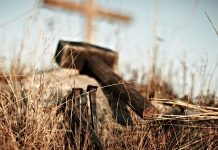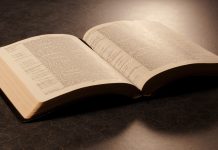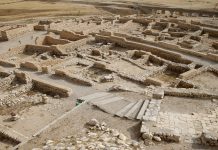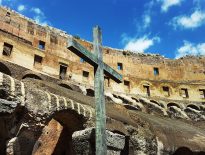The book written by John Ortberg, All the Places to Go… How Will You Know? invites us to reflect on the discerning of God’s will for our lives.
More than ever, we feel pressured by the burden of the “perfect choice”, finding ourselves vulnerable and insecure in the face of big decisions, dominated by the fear of failure more than we are excited by the freedom of choice. On the other hand, we tend to move the less important decisions to a secondary, neutral place, as if God does not get involved in the trivial things of life.
With a PhD in clinical psychology from the Fuller Theological Seminary in Pasadena, California, lecturer, Presbyterian pastor, and well-known writer, John Ortberg addresses in his book the complex theme of recognising and capitalising on divine opportunities.
Written in an accessible language and filled with examples from the lives of biblical characters, but also from everyday life, the book is an invitation to live life as an extraordinary adventure, in which every open door hides unsuspected possibilities to develop one’s character, but also to spread the received blessing.
Ortberg starts from his college professor Gerald Hawthorne’s analysis of the meanings of the door metaphor in literature, ultimately arriving at the image of the open door “that no one can shut” in Revelation 3:8. In the Bible, the open door symbolises “boundless opportunities. Of unlimited chances to do something worthwhile; of grand openings into new and unknown adventures of significant living; of heretofore unimagined chances to do good, to make our lives count for eternity.”
At the same time, open doors do not guarantee that everything will flow smoothly beyond the threshold and do not offer full insights into the future—rather, they are opportunities to act with God and for Him, Ortberg says.
In the first chapters of the book, the author analyses the open-door mentality, reviews the most common myths about open doors, and exposes the vulnerable points of the fear of missing out, so familiar to the modern human.
Open doors disturb us even more than those that remain closed, because of our tendency to settle in our comfort zones, which is precisely why Ortberg considers faith to be the most solid foundation for an open-door mentality. On the other hand, although the closed-door mentality is often categorised as prudence or common sense, it remains emblematic of the fear of trusting God unreservedly.
One of the outstanding characteristics of open-door people is that they are ready to act despite uncertainty. The idea that we must be prepared before taking the next step is excessively circulated and valued, says the author, noting that many of the biblical characters hesitated to say “I’m ready” in front of the doors opened by God.
Moses invokes his speech impediment when he is sent before the Pharaoh (Exodus 4:10); Gideon sees his family’s economic status as an obstacle to his mission to free his people from their oppressors (Judges 6:15); Jeremiah thinks he is too young to become God’s messenger (Jeremiah 1:6); the rich young ruler is not ready to give up material privileges to follow Jesus (Matthew 19:22). In the end, the decision to enter the doors opened by God is not based on the feeling that one is (or isn’t) ready, but on the faith that He is ready to carry out His plan.
The most common myths about how God leads us start from the premise that the biggest problems that are in dire need of transformation are outside of us. Thus, we may believe that small, insignificant things are not the object of God’s concern or that opening the correct door implies that the road that follows will be obstacle-free. In the same way we can delude ourselves that there is only one right door for every decision or that choosing the wrong door takes us outside the perimeter of God’s will.
The reality is that it is our interior that needs change, and this journey through the open and closed doors of life has the role of shaping our faith, sharpening our discernment, and developing our judgement. We might expect God to deal more with external circumstances, but His favourite field of action is the polishing of our characters.
Ortberg uses the story of King Saul to illustrate the dichotomy between faith and superstition. Through superstition, we seek the fulfilment of our own plans, using for this purpose the supernatural force (“Magic desires to obtain its effects without entering into relation, and practises its tricks in the void”,[1] says Martin Buber), while faith submits our plans to His plans and revolves around the relationship with Him.
A section of the book analyses the “Jonah complex” to decipher the most common reasons why we say “no” to God when He invites us to cross the threshold into the unknown. Most often, our refusal is motivated by fear. Jonah needed courage to go to Nineveh and preach against this city whose name was synonymous with extreme danger and cruelty.
Fear cannot be defeated by avoiding the situation that causes it, and the story of Jonah teaches us that running away from God’s call means running away from His presence—but also that the surest antidote to fear is the divine presence.
Neglecting prayer is another factor that causes us to lose sight of the doors God has opened. (It is only when he reaches the lowest threshold of his experience that Jonah cries out to God—and after this chapter of prayer good things begin to happen). The absence of love and a wrong image of God are other reasons why we miss His open doors.
A chapter of the book is dedicated to the way in which recognising an open door and passing through it reveals more or less pleasant truths about ourselves. The critical factor in identifying God’s open doors is self-knowledge (which does not overlap with self-awareness), Ortberg says.
We need to become aware of how we were created, to know our strengths and weaknesses, values and motivation, and how we respond to open door opportunities (impulsively, without assessing the cost, or in a resisting manner, excessively focusing on risks or insufficient tools).
One of the lessons we learn in the process of discerning God’s will is that He does not ask us to make perfect decisions, but decisions that are perfectly submitted to Him.
The final chapter, “The Door in the Wall”, resumes the message that runs through the book like a red thread: God is a God of open doors—from the first door, of redemption, which we see opening in the pages of Genesis, to the open gates of the city that will shelter the redeemed (“On no day will its gates ever be shut…”—Revelation 21:25).
We are defined by the problems we have, writes Ortberg, emphasising that God calls us to face problems and that, in order to mature spiritually, we need problems that are worth the investment of energy, problems that are worth dedicating our lives to—God-sized problems.
We need to face our problems by clinging less and less to what lies beyond (or before) the door and increasingly desiring the One who opens the doors.
Carmen Lăiu is an editor at Signs of the Times Romania and ST Network.




















